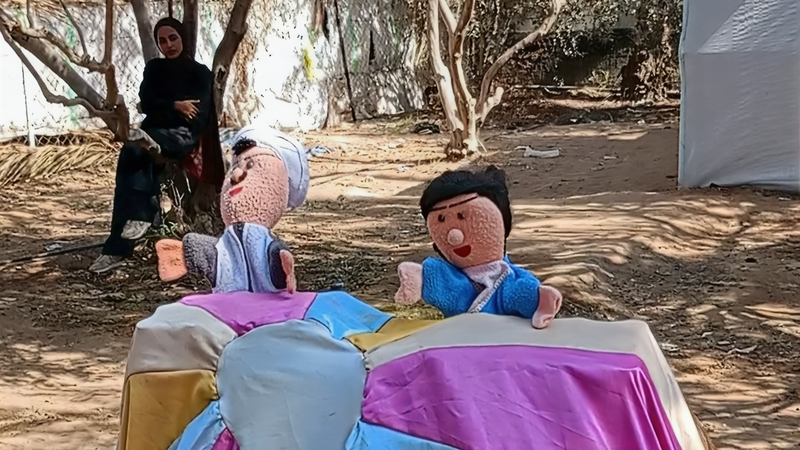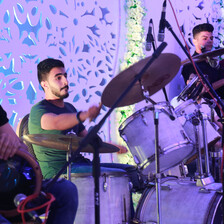The Electronic Intifada 16 April 2025

Children at a shelter camp west of Gaza City use puppets to talk about their displacement.
The Electronic IntifadaAntar said to Smurfette: “Do you remember when we used to go to school together and learn languages and math?”
Smurfette replied: “The war destroyed our schools, Antar, and now we spend our lives standing in long bread and water queues.”
Antar continued: “Do you remember, Smurfette, when we used to sleep on warm beds in our big homes?”
Smurfette answered: “The war destroyed our homes, Antar, and now all we have are tents and sleeping on the sand.”
Smurfette and Antar are puppets, and they were brought to life on this late March day by Mahmoud Mousa, 12, and Khalil Abboud, 13, as they hid behind a shimmering multicolored cloth draped over a piece of wood.
The makeshift theater and its audience of children are located in a shelter camp west of Gaza City. Many of the children in the audience are from Beit Hanoun, and they are in Gaza City now because the Israeli army issued evacuation orders on 18 March for residents of those areas.
Antar and Smurfette are thus telling a story that is all too familiar to children in Gaza: displacement, living in a tent, waiting in long lines for water and food. The children in the audience listened closely to the puppets’ story, and most smiled throughout as they remembered how life used to be.
Khalil, who played Smurfette, was displaced from Beit Hanoun, and he said he loves acting and was excited to participate.
“We all feel sad about what happened, but the play allowed us to express our suffering differently,” he said. “I wanted to tell everyone not to lose hope.”
Not just entertainment
The Tamer Institute for Community Education provides psychological support to children living in shelters in Gaza, and it organized the puppet show to provide an outlet for them to talk about hard things.
“Through these activities, we try to give children a space to express their feelings artistically,” Sumaya Salem, a Tamer volunteer, told The Electronic Intifada.
This space is needed because, according to a study conducted by the Gaza-based Community Training Centre for Crisis Management, 77 percent of children in Gaza “avoid talking about traumatic events” and 96 percent “feel death is imminent.”
The play is not just entertainment, Salem said, “but part of the psychological support process that these children, who have lived through harsh experiences during the war, desperately need.”
She handmade the puppets used by Mahmoud and Khalil out of old clothing, since no new goods are flowing into Gaza, and she stuffed them with rice.
Nearby, 13-year-old Sara Ayad sat under a tree, hugging her small doll.
“I laughed when Antar said we always stand in lines,” she said. “It’s true – every day we stand in long lines.”
She said that the play showed how the war has stolen their childhood because now they must take on the adult tasks of helping find food and water.
In another corner of the camp, Omar al-Tawil, 10, said: “When they said schools were destroyed, I felt sad. I loved school so much and wished to return to it.”
“The play was beautiful because it talked about our reality, but it gave hope that we will return.”
“How long will we stay like this?”
Antar asked: “Where is the salvation, Smurfette? How long will we stay like this?”
Smurfette replied: “We must not lose hope, Antar. One day we will return to our lives.”
When the performance ended, Mahmoud and Khalil stepped out from behind the cloth and accepted applause from the audience.
Mahmoud, who played Antar, lives in a tent at a shelter west of Gaza City.
“This puppet show gave me a chance to practice my acting hobby that I used to do at my school theater,” he said. “I wanted to be Antar because I feel just like him. I lost my home and my school, and all I wish for is to return to our old life.”
Mahmoud’s school was destroyed by an Israeli attack, just as the vast majority of schools in Gaza have been. The United Nations estimates that 85 percent of schools have been damaged or hit by Israeli attacks.
“At first, I was afraid of failing to make the children happy, but when I saw them smile, I felt I had done something beautiful for them.”
Rasha Abou Jalal is a journalist in Gaza.





